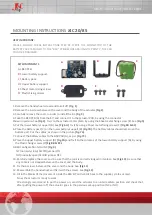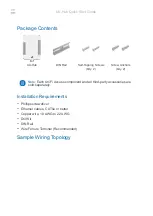
6 CLOCK MANAGEMENT UNIT (CMU)
6-6
Seiko Epson Corporation
S1C33L26 TECHNICAL MANUAL
Other PLL Settings
6.4.4
V-Divider
To ensure that frequency f
VCO
obtained by <output frequency
×
W> falls within the range of 100 to 400 MHz,
set the proper W value using PLLV[1:0]/CMU_PLLCTL0 register. Lower value is better for low power con-
sumption.
4.4.1 W Value Settings
Table 6.
PLLV[1:0]
W
0x3
8
0x2
4
0x1
2
0x0
Setting prohibited
(Default: 0x1)
VCO Kv constant (VC value)
According to the range of f
VCO
frequencies obtained by <output frequency
×
W>, set the VCO Kv circuit con-
stant (VC value) using PLLVC[3:0]/CMU_PLLCTL1 register.
4.4.2 VC Value Settings
Table 6.
PLLVC[3:0]
f
VCO
[MHz]
0x8
360 < f
VCO
≤
400
0x7
320 < f
VCO
≤
360
0x6
280 < f
VCO
≤
320
0x5
240 < f
VCO
≤
280
0x4
200 < f
VCO
≤
240
0x3
160 < f
VCO
≤
200
0x2
120 < f
VCO
≤
160
0x1
100
≤
f
VCO
≤
120
Other
Setting prohibited
(Default: 0x1)
LPF resistance value (RS value)
According to the input clock frequency, set the LPF resistance value (RS value) of the PLL by using PLL-
RS[3:0]/CMU_PLLCTL1 register.
4.4.3 RS Value Settings
Table 6.
PLLRS[3:0]
f
REFCK
[MHz]
0xa
5
≤
f
REFCK
< 20
0x8
20
≤
f
REFCK
≤
150
Other
Setting prohibited
(Default: 0x8)
LPF capacitance value (CS value)
Bits to set the LPF capacitance value (CS value) is provided in the CMU control registers, PLLCS[1:0]/CMU_
PLLCTL2 register. However, do not alter the value of these bits, and leave them as initially set (0x0).
Charge pump current value (CP value)
Bits to set the charge pump current value (CP value) is provided in the CMU control registers, PLLCP[4:0]/
CMU_PLLCTL2 register. However, do not alter the value of these bits, and leave them as initially set (0x10).
4.4.4 PLL Setting Examples
Table 6.
OSC3 clock
PLL output clock PLLINDIV[3:0]
PLLN[3:0]
PLLV[1:0]
PLLVC[3:0]
PLLRS[3:0]
6 MHz
72 MHz
1/1 (0x0)
x12 (0xb)
0x1
0x2
0xa
60 MHz
1/1 (0x0)
x10 (0x9)
0x1
0x1
0xa
10 MHz
70 MHz
1/1 (0x0)
x7 (0x6)
0x1
0x2
0xa
40 MHz
1/1 (0x0)
x4 (0x3)
0x2
0x2
0xa
20 MHz
60 MHz
1/1 (0x0)
x3 (0x2)
0x1
0x1
0x8
40 MHz
1/1 (0x0)
x2 (0x1)
0x2
0x2
0x8
36 MHz
72 MHz
1/1 (0x0)
x2 (0x1)
0x1
0x2
0x8
48 MHz
72 MHz
1/8 (0x7)
x12 (0xb)
0x1
0x2
0xa
60 MHz
1/8 (0x7)
x10 (0x9)
0x1
0x1
0xa
















































